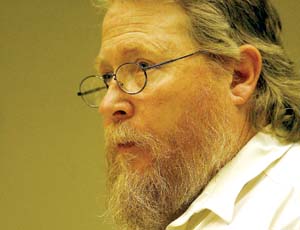
The City Council on Monday approved a three-year contract to
sanction the Hollister Independence Rally
– while city brass warned if more outside officers don’t commit
in the next couple months, the seven-year-old tradition could still
be canceled.
After the Council unanimously approved the contract, a
spattering of applause ensued from the gallery.
The City Council on Monday approved a three-year contract to sanction the Hollister Independence Rally – while city brass warned if more outside officers don’t commit in the next couple months, the seven-year-old tradition could still be canceled.
After the Council unanimously approved the contract, a spattering of applause ensued from the gallery.
Perhaps it was a showing of cautious exuberance. Or perhaps it was a blend of excitement and exhaustion, relief after weeks of often arduous meetings between rally organizers and city leaders.
“I think we worked it out,” said Bill Rodgers, president of the Hollister Independence Rally Committee (HIRC). “It’s been a long, long hard thing.”
He went on: “We’re exhausted – we really are.”
The Council, as Mayor Tony Bruscia put it, took a “huge risk” in approving a contract without the needed confirmations from outside law enforcement agencies.
But the contract includes a clause that allows the city to cancel the rally at any time if HIRC isn’t meeting its obligations – or if the Council doesn’t feel it’s providing adequate safety.
As of Monday, the city had received zero commitments of the 40 desired outside peace officers, said Police Chief Jeff Miller at the meeting.
Miller attributed this year’s problems attaining help from outside agencies to statewide budget issues. Many departments’ staffing levels are depleted, and others must tend to their own local events, he said.
Fifteen officers’ departments have tentatively committed – but without signed contracts, Miller said. And another 38 officers await permission from their department heads.
Of nearly 100 departments throughout the state, Hollister awaits word from 41 jurisdictions and has received outright decline notices from 54 others.
Before the Council approved the contract, Bruscia sent out a warning shot from the dais – an acknowledgment he’s not comfortable with just the contract approval.
Clearly, he said, the rally boosts the local economy. But on the other hand, the Council, he said, maintains an equal obligation to keep the streets safe.
“Anybody who tries to say this rally isn’t good for this community is crazy,” Bruscia said after the meeting. “But how do you put a price on safety of the community?”
One of the event’s founders, Mark Maxwell, joins many other rally enthusiasts who believe the policing levels create security overkill. Maxwell, who cited there being no major problems in previous years, called the law enforcement concerns “unfounded.”
Resident Cliff Cardoza who spoke during public comment also downplayed the Council’s regard – calling it “overconcern.”
“It’s not something that you can’t solve,” he said.
Regardless of such rhetoric, as long as the security desires of the city are met, officials expressed confidence the rally tradition would be safe.
Previously, HIRC’s ability to skyrocket its revenues by $280,000 this year – it previously generated about $200,000 a year – also threatened the rally’s future. Organizers have to come up with that money to offset Hollister’s and other jurisdictions’ demands for security compensation.
Through several revenue enhancements, including a $5 parking fee for motorcycles downtown, HIRC now estimates it could generate nearly $500,000.
Formerly skeptical city officials, including City Manager Dale Shaddox, now show confidence in HIRC’s ability to pay for security. It’s just a matter of finding it.
“HIRC’s doing what they’ve got to do,” Bruscia said.
Aside from the two main issues, security and rally revenue, the Council made a few adjustments to contract provisions before the approval.
They listened as HIRC Executive Director Bob Beals requested a later exiting time for street vendors on the rally’s final day – he pushed for 10 p.m. instead of the slated 8 p.m.
In making the motion for the contract’s approval, Councilman Tony LoBue signed off on a middle ground of a 9 p.m. exit time – that’s when they’re supposed to be cleared out.
Also, upon Bruscia’s suggestion, any amount the city earns from sales tax beyond a $60,000 credit Hollister would grant HIRC, the two parties would split 50-50.
Beyond that, other changes include the previously agreed upon expansion of the rally boundaries and higher fees to vendors.
Council members acknowledged, though the rally seems headed toward happening in 2004, the problem with security in future years, isn’t going away.
Councilman Robert Scattini said the city would have to use “more creative ideas” next year. Councilwoman Pauline Valdivia called next year “another challenge.”
“It’s really a community event,” Valdivia said. “It’s not just a motorcycle event.”
“It means a lot,” Scattini said, “to a lot of people.”









